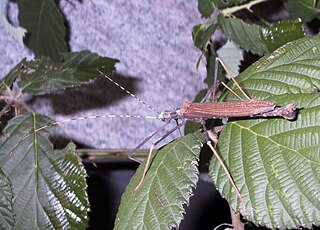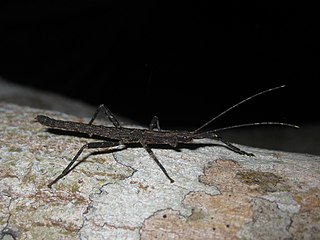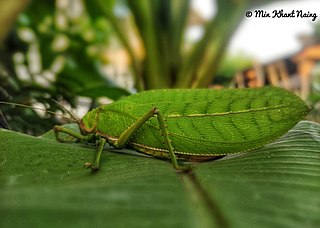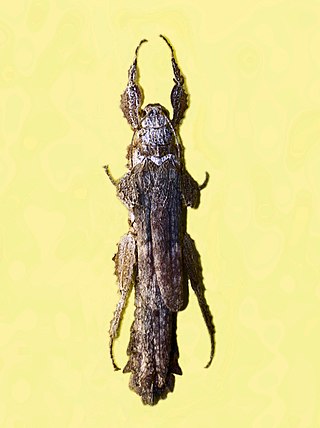
Conocephalus is a genus of bush crickets, known as coneheads. It was described by Carl Peter Thunberg in 1815.

The family Phylliidae contains the extant true leaf insects or walking leaves, which include some of the most remarkably camouflaged leaf mimics (mimesis) in the entire animal kingdom. They occur from South Asia through Southeast Asia to Australia. Earlier sources treat Phylliidae as a much larger taxon, containing genera in what are presently considered to be several different families.

Pseudophasmatidae is a family of stick insect, in the suborder Verophasmatodea, commonly called the "striped walkingsticks". An important identifying characteristic is its mesothorax, which is never more than three times as long as the prothorax.

Malacomorpha is a genus of striped walkingsticks in the family Pseudophasmatidae. There are about 15 described species in the genus Malacomorpha.

The subfamily Pseudophyllinae contains numerous species in the family Tettigoniidae, the katydids or bush crickets. Sometimes called "true katydids", together with the crickets of suborder Ensifera, they form part of the insect order Orthoptera which also contains grasshoppers.

The Phaneropterinae, the sickle-bearing bush crickets or leaf katydids, are a subfamily of insects within the family Tettigoniidae. Nearly 2,060 species in 85 genera throughout the world are known. They are also known as false katydids or round-headed katydids.

Prisopus is a genus of stick insects belonging to the family Prisopodidae. These stick insects are present in Central and South America, India and Malesia.

Conocephalinae, meaning "conical head", is an Orthopteran subfamily in the family Tettigoniidae.

Neoconocephalus is a genus of katydids or bush crickets in the tribe Copiphorini, from the Americas.

Orchelimum is a genus of katydid with 21 known species.

Amblycorypha is a North American genus of round-headed katydids in the family Tettigoniidae. There are about 14 described species in Amblycorypha.

The Heteropterygidae is a family of stick insects belonging to the suborder Euphasmatodea. Species can be found in Australasia, East and Southeast Asia. About 150 valid species have been described.

Pylaemenes is a genus of stick insects in the family Heteropterygidae and subfamily Dataminae. It combines small to medium-sized, often brightly colored Phasmatodea species. Their representatives are found in large parts of Southeast Asia.

Datamini is the only tribe within the subfamily of the Dataminae from the order of the Phasmatodea. The representatives of this subfamily are on average not as large as those of the other two subfamilies belonging to the family of Heteropterygidae.

The genus Tisamenus native to the Philippines combines small to medium-sized species of stick insects.

Theramenes is a genus of medium-sized stick insects in the tribe Obrimini, which is native to the Philippines and to the Indonesian Talaud Islands.

The Cladomorphinae are a subfamily of stick insects in the family Phasmatidae. This taxon is particularly well represented in the Neotropical region, but records also exist for Madagascar, Java and the Maluku Islands.

Heterocopus is a monotypic stick insect genus, containing Heterocopus leprosus as the only valid species.

Brasidas cavernosus is a representative of the stick insects native to the Philippine island Luzon. It is considered one of the largest species in the subfamily Obriminae.

Tisamenus draconinus is a species of stick insect in the family Heteropterygidae native to the Philippines.



















